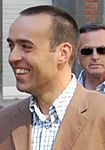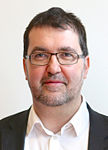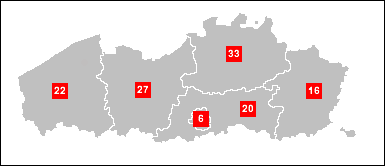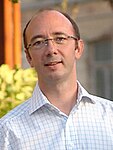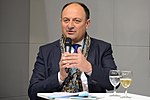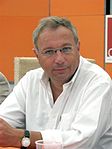
Belgium is a federal state with a multi-party political system, with numerous parties who factually have no chance of gaining power alone, and therefore must work with each other to form coalition governments.
On 13 June 2004, regional elections were held in Belgium, to choose representatives in the regional councils of the Flemish Parliament, the Walloon Parliament, the Brussels Parliament and the German-speaking Community of Belgium. The elections were held on the same day as the European elections.
Regional elections were held in Belgium, to choose representatives in the regional councils of Flanders, Wallonia, Brussels and the German-speaking Community on 13 June 1999. The regional elections were held on the same day as the European elections and the federal elections.

Flemish political parties operate in the whole Flemish Community, which covers the unilingual Flemish Region and the bilingual Brussels-Capital Region. In the latter, they compete with French-speaking parties that all also operate in Wallonia. There are very few parties that operate on a national level in Belgium. Flanders generally tends to vote for right-wing, conservative parties, whereas in French-speaking Belgium the socialist party is usually the most successful one.

The Flemish Government is the executive branch of the Flemish Community and the Flemish Region of Belgium. It consists of a government cabinet, headed by the Minister-President and accountable to the Flemish Parliament, and the public administration divided into 13 policy areas, each with an executive department and multiple agencies.

The Belgian provincial, municipal and district elections of 2006 took place on Sunday 8 October 2006. The electors have elected the municipal councillors of 589 cities and towns as well as the ten provincial councils. The voters in the town of Antwerp have also been able to vote for the city's district councils. In seven Flemish municipalities with a special language statute and in the Walloon municipality of Comines-Warneton the aldermen and the members of the OCMW/CPAS council have also been directly elected.

The 2007 Belgian federal election took place on Sunday 10 June 2007. Voters went to the polls in order to elect new members for the Chamber of Representatives and Senate.
The 2007–2008 Belgian government formation followed the general election of 10 June 2007, and comprised a period of negotiation in which the Flemish parties Flemish Liberal Democratic, Christian Democratic and Flemish (CD&V) and New Flemish Alliance (N-VA), and the French-speaking parties Reformist Movement (MR), Democratic Front of Francophones (FDF) and Humanist Democratic Centre (CdH) negotiated to form a government coalition. The negotiations were characterized by the disagreement between the Dutch- and French-speaking parties about the need for and nature of a constitutional reform. According to some, this political conflict could have led to a partition of Belgium.

The government of the Brussels-Capital Region is the political administration of the Brussels region of Belgium. An election is held every five years. The government is headed by a Minister-President, four ministers and three state secretaries.

Elections for the Federal Parliament were held in Belgium on 13 June 2010, during the midst of the 2007-11 Belgian political crisis. After the fall of the previous Leterme II Government over the withdrawal of Open Flemish Liberals and Democrats from the government the King dissolved the legislature and called new elections. The New Flemish Alliance, led by Bart De Wever, emerged as the plurality party with 27 seats, just one more than the francophone Socialist Party, led by Elio Di Rupo, which was the largest party in the Wallonia region and Brussels. It took a world record 541 days until a government was formed, resulting in a government led by Di Rupo.
Following the Belgian general election held on 13 June 2010, a process of cabinet formation started in Belgium. The election produced a very fragmented political landscape, with 11 parties elected to the Chamber of Representatives, none of which won more than 20% of the seats. The Flemish-Nationalist New Flemish Alliance (N-VA), the largest party in Flanders and the country as a whole, controlled 27 of 150 seats in the lower chamber. The Francophone Socialist Party (PS), the largest in Wallonia, controlled 26 seats. Cabinet negotiations continued for a long time. On 1 June 2011, Belgium matched the record for time taken to form a new democratic government after an election, at 353 days, held until then by Cambodia in 2003–2004. On 11 October 2011, the final agreement for institutional reform was presented to the media. A government coalition was named on 5 December 2011 and sworn in after a total of 541 days of negotiations and formation on 6 December 2011, and 589 days without an elected government with Elio Di Rupo named Prime Minister of the Di Rupo I Government.

The Belgian provincial, municipal and district elections of 2012 took place on 14 October. As with the previous 2006 elections, these are no longer organised by the Belgian federal state but instead by the respective regions:

The Verhofstadt II Government was the federal government of Belgium from 12 July 2003 to 21 December 2007.

The Di Rupo Government was the federal cabinet of Belgium sworn in on 6 December 2011, after a record-breaking 541 days of negotiations following the June 2010 elections. The government included social democrats (sp.a/PS), Christian democrats (CD&V/cdH) and liberals, respectively of the Dutch and French language groups. The government notably excluded the New Flemish Alliance (N-VA), the Flemish nationalist party which achieved a plurality and became the largest party. Its absence, together with the unwillingness of Open Vld to enter into an eight-party coalition that included the green parties, caused the government coalition to lack a majority in the Dutch language group. It was the first time that the Belgian prime minister had been openly gay, as Di Rupo became the world's first male openly gay head of government. Elio Di Rupo became the first native French-speaking prime minister since 1979 and the first prime minister from Wallonia since 1974 and first socialist prime minister since 1974.

Federal elections were held in Belgium on 25 May 2014. All 150 members of the Chamber of Representatives were elected, whereas the Senate was no longer directly elected following the 2011–2012 state reform. These were the first elections held under King Philippe's reign.
Following the simultaneous federal elections and regional elections of 25 May 2014, negotiations started to form a new Federal Government as well as new regional governments: a Flemish, Walloon, French Community and Brussels Government. A Government of the German-speaking Community was formed only a few days after the elections.

The 2019 Belgian federal election will take place on the same day as the 2019 European Parliament elections and the 2019 Belgian regional elections, being 26 May 2019, unless snap elections are called.
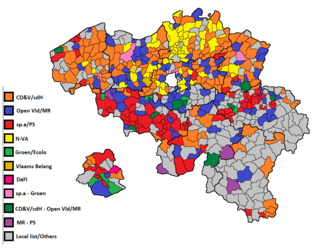
The Belgian provincial, municipal and district elections of 2018 took place on Sunday 14 October 2018. They are organised by the respective regions:
The 2019 Belgian regional elections will take place on Sunday 26 May, the same day as the 2019 European Parliament election as well as the Belgian federal election unless snap federal elections are called.







